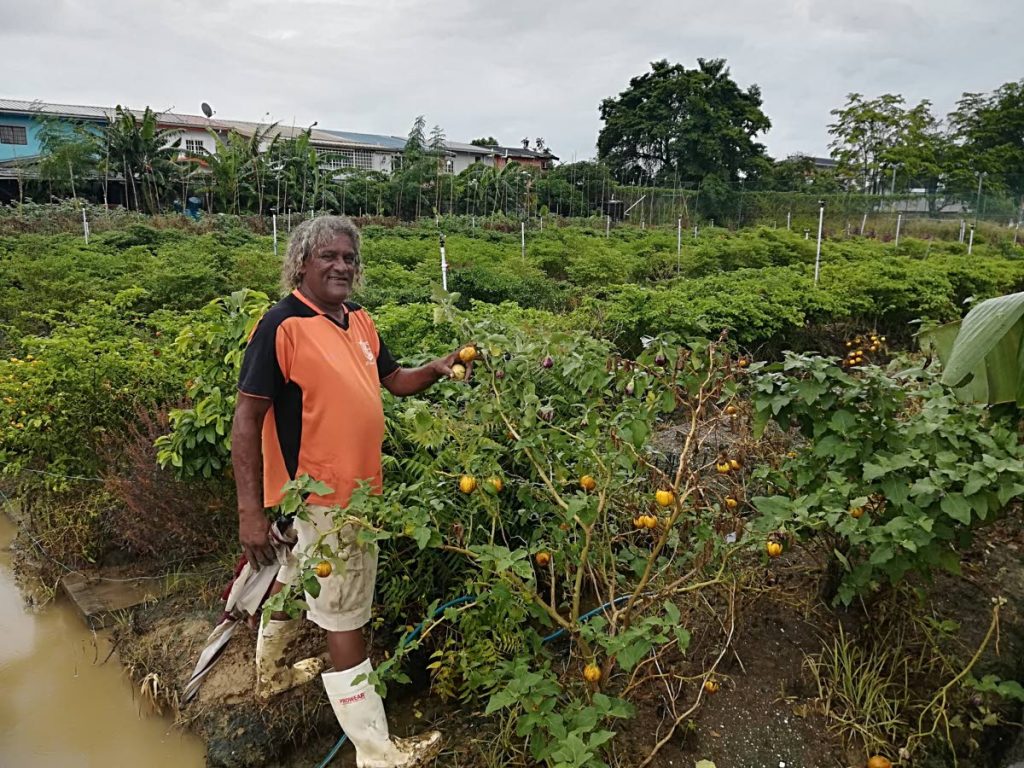Let baigans be baigans

“Taste that,” says Nick Hakim, snapping me off an ochro from his vegetable garden.
“I never knew you could eat them raw,” I say, surprised.
“Yes man, that's the best way.”
The pale green ochro bites through crisp and sweet. I am taken aback by its freshness.
He points to a pigeon peas tree.
“I’m the only man growing that in Trinidad,” he says proudly.
Since the botanist John Spence died in 2013, his assertion may be correct. Regardless, I’m amazed to see a tree like this in an independent grower’s garden.
Nick’s garden is at Presentation College, Chaguanas. Opposite the sports fields, his half-acre plot of land has an abundance of the finest tasting vegetables you could eat. And some fruit too. Oh, and some herbs. And medicinal plants.
It’s a revelation. Having recently turned vegetarian, my despair at the limited range, poor quality and obscene prices in the supermarkets drove me to seek out the farmer’s markets organised by the National Agricultural Marketing and Development Corporation (NAMDEVCO).

On my first visit to the Queen’s Park Savannah market (Saturdays from 6 am) I met Nick packing up to leave and came away with a huge bag of surplus baby baigan that he gave me for free.
For too long I’d been at the mercy of US-imported food; soft waxy apples, chemical-pumped potatoes and genetically modified watermelons. Green Giant-branded Portobello mushrooms on sale at my local Massy for $48 was the final straw. Ho, ho, ho indeed!
The monopolisation and manipulation of consumer dollars by corporations in Trinidad is disgraceful. Middlemen wholesalers take profit away from small farmers who used to supply supermarkets directly. They drive up prices for shoppers as well as cynically enticing them with branded items they don’t need. Every day, poor families fill their trollies with things in tins and plastic, blind to the fresh local produce they could be buying elsewhere.
NAMDEVCO’s markets take place every weekend at venues across the country. Aromatic basil from the Paramin hills? Giant cassava roots pulled from the Rio Claro earth? Keitt mangoes from Wallerfield trees? It’s all there and more.
I arranged to visit Nick in Central a few days after I met him. Under gloomy rain clouds, we splashed along the muddy pathways between his crops, while he pointed everything out.
Among the rows of bird pepper, and baigan of assorted shapes and sizes in purple, white and green, were eddoes, sweet potato, passion fruit, pawpaw, plums, pomerac, coconut, bananas, bell peppers, coriander, corn, marigold (a natural insecticide), neem (a fungicide), soursop, bodi, lemongrass (the tea I made the following day put fire in my belly) tulsi (“the second fastest oxygen producing plant in the world after cannabis”), poi bhaji (“good for women”) and datur, which Nick says locals sometimes use to make “joy juice” – a hallucinogen that can make them strip naked and run into the road. A better usage, he suggests, is applying it to the penis as a natural Viagra.
“I don’t have a farmer’s badge,” he tells me. But he studied agriculture in Canada, gives free lectures at the Farmers Training Centre and once helped Ukrainian villagers revitalise their fields. They begged him to stay, but Nick belongs in Trinidad, and is a gift to this country.
“I born in a dirt house with a grass roof and my mother used to have to grow garden for us, her five children. She used to mind cow, so she making ghee, yoghurt, dahi. Teaching girls to sew...”
His mother grew everything – black-eyed beans, dasheen bush, bhaji – and the cow’s dung served as fresh manure.
Born in 1958 in Orange Field Road, Carapichaima, he learned a lot from his once impoverished family and community, three miles away from the Temple In The Sea.
“Caroni land all around had sugar cane. People started to live on the riverbank to have access to water. Everybody was surviving on garden.”
As a child he saw the huge shipments of fruit leaving for England, which encouraged him to keep growing. Since discovering oil, he says, the government shut down agriculture. The grants for young farmers are “talk” he says, “talk is cheap.”
Nick attended Presentation College from 1971 to ‘76 and when he returned 29 years later and saw the Samaan trees cut down, he proposed a garden.
Minister of Agriculture Clarence Rambharat has promised several times to visit. Nick wants to explain how he could improve soil from Caroni River to Icacos with calcium and magnesium-rich Northern Range limestone dust. Instead it is dumped as quarry waste. Piles of sulphur from Petrotrin’s diesel cleaning could improve the taste of vegetables. That too gets wasted.
I urge minister Rambharat to make good that promise.
One thing, I ask. Why so many baigans?
“I’m strange, sir,” he replies. “I don’t want to be like everybody.”
But growing vegetables ought not to be strange. Agriculture should be revitalised, as politicians say, from the ground up.

Comments
"Let baigans be baigans"